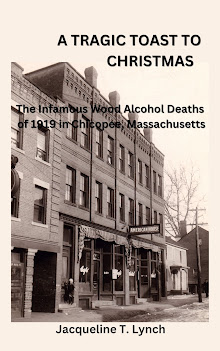Tuesday, March 27, 2012
A Stroll from New Hampshire to Vermont
Posted by
Jacqueline T. Lynch
at
7:26 AM
2
comments
![]()
Labels: 18th Century, colonial period, geography, infrastructure, New Hampshire, Vermont
Tuesday, March 20, 2012
Summer Theatre - Connecticut, 1950
On the official last day of winter, it may be a bit early to mention summer theatre. This is the time, however, for seasons to be planned, auditions scheduled, and an enormous amount of off-stage work that has to be done before the slights go up in the barn this July. Here’s a look at four summer theaters in Connecticut and their offerings in August 1950.
The 1950s, with the help of the automobile and post-war disposable income, bloomed as a heyday of New England summer theatre. These ads from The Hartford Courant show the Canton playhouse, which was a barn at the juncture of routes 177 and 44, where Noel Coward’s “Tonight at 8:30” featuring a “professional cast” wowed the patrons of a summer evening. This was produced by the Show Shop company run by Stanley and Joan Cobleigh, who founded the group around 1940.
Nearby Unionville put on “Cradle Song” at the Town Hall, next up, “The Philadelphia Story”.
Down by the Sound, Clinton Playhouse, boasting of air conditioning -- not something you’d usually find in summer theatre -- featured Charles Quigley in “the recent Broadway success” of “The Magnificent Yankee”. Seats running anywhere from 70 cents to $2.40.
Over at Ivoryton, the Playhouse featured Raymond Massey in “Our Town”. According to the New London Day, August 15, 1950, Mr. Massey’s stepdaughter, Dorothy Whitney, made her stage debut as Emily. Also in the cast were Jane Seymour, Dorrit Kelton, Arthur Walsh as George, Hal Courier and Leonard Lord. “Several curtain calls at the end attested the quality of the performance,” recorded the reviewer, George H. Grout.
Of this wealth of summer stock, I believe only Ivoryton is still going strong today, and as a year-round theater. According to its website: “...the Ivoryton Playhouse became the first self-supporting summer theater in the nation. Older theaters as in Dennis, MA, and Skowhegan, ME, were not self-supporting, but endowed by foundations of wealthy families.” The Ivoryton Playhouse opened in 1930, with Bette Davis trodding the boards. Katharine Hepburn spent a season of several shows here, and many Hollywood names performed on its stage.
For more on the Ivoryton Playhouse, have a look at this website. For more on the Canton’s Show Shop productions, have a look at this article by Sylvia Cancela.
Posted by
Jacqueline T. Lynch
at
8:07 AM
0
comments
![]()
Labels: 20th Century, Connecticut, theatre
Tuesday, March 13, 2012
Irish Famine Memorial - Boston
The Irish Famine Memorial depicts two families and the schism between the old world and the new; the horrific past, and a hopeful future.
Two sculptures by Robert Shure show two families. One suffers the agony of the Great Hunger. The other family tentatively takes its first steps on American soil, representatives of the great Irish diaspora that caused millions to leave their homeland to escape death.
Part of Boston’s Freedom Trail, located on Washington and School streets, the bronze and granite memorial was dedicated in June 1988 to commemorate the 150th anniversary of the Famine. One and a half million Irish emigrated to America during the famine years.
For more on the memorial, have a look at this website. For more on sculptor Robert Shure, have a look here.
Posted by
Jacqueline T. Lynch
at
7:45 AM
2
comments
![]()
Labels: 19th century, 20th Century, art, Massachusetts
Tuesday, March 6, 2012
There Once was a Man from Nantucket
All right, get your minds out of the gutter. It’s not THAT limerick. It’s these, first started in 1902 by the Princeton Tiger:
There once was a man from Nantucket
Who kept all his cash in a bucket.
But his daughter, named Nan,
Ran away with a man
And as for the bucket, Nantucket.
The Chicago Tribune afterwards took up the challenge and fired off a round:
But he followed the pair to Pawtucket,
The man and the girl with the bucket;
And he said to the man,
He was welcome to Nan,
But as for the bucket, Pawtucket.
According to Nantucket’s Yesterday’s Island, vol. 17, no. 12, July 1988, the Exchange took a turn:
Then the pair followed Pa to Manhasset,
Where he still held the cash as an asset;
But Nan and the man
Stole the money and ran,
And as for the bucket, Manhasset.
Rhode Island’s Pawtucket Times evidently got tired of being mentioned and decided to contribute:
Of this story we hear from Nantucket,
About the mysterious loss of a bucket,
We are sorry for Nan,
As well as the man --
The cash and the bucket, Pawtucket.
In the following decades, Yesterday’s Island has opened the floor to contributions to the sad tale of the man with the bucket, and you can read some of them here online. And the originals online at Life, v. 41, Princeton University, January-June 1903.
As for the naughty version, that’s achieved its own place in American literature, too.
Posted by
Jacqueline T. Lynch
at
7:36 AM
0
comments
![]()
Labels: 20th Century, literature, Massachusetts


















